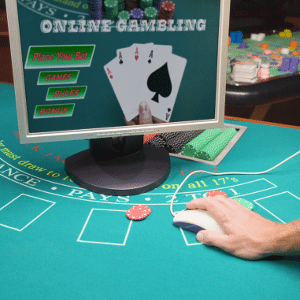Legal Online Poker Slowly Spreading State by State
When Nevada unveiled a trial run of legalized online poker this spring, it became the first and — so far — only state to allow the Internet version of the game since the federal government shut down a number of sites two years ago. Ultimate Poker offers an opportunity for anyone in the state to join in a poker game while sitting in their living room, with no need to make the trek to a casino. While Nevada is unique in this respect to date, it could soon be joined by other states with their own online gaming halls. Games hosted by overseas companies had widespread clientele across the United States, but the government seized their domains in 2011 and shut them down in a cyber raid known as “Black Friday,” resulting in thousands of players not being able to access the money they had put into them. Online gambling in general has been considered illegal under the 1961 Wire Act that criminalizes betting on sporting events. However, in December 2011 the Justice Department issued an opinion that the Wire Act only applied to sports betting, which gave a green light to states to legalize other forms of online gaming as long as it was restricted to people within state limits. That means the Nevada law applies to people in-state only. “Nevada has issued some licenses, but the applicable regulations prohibit non-residents from actually playing for real money,” says Lawrence G. Walters, managing partner of the Walters Law Group, who follows online gaming law. “All licensed poker software is required to have robust geo-location verification built in. So it is unlikely that a non-resident will be able to participate, unless they are a skilled hacker.”
Poker Pockets



 Delaware is the only other state where online poker playing could technically be legal under current law, but current projections indicate that poker will not be included when they roll out live online gambling sites in September. Lawrence G. Walters Because the population of the state is so small, at under a million people, there are questions about the viability of an in-state only poker industry. Officials may wait until more states allow the game so they can partner together and increase the pool of potential players. “Ultimately, states where legalization has occurred may form compacts so that they can share players with each other, resulting in ‘pockets’ of legal online poker throughout the U.S.,” Walters says. New Jersey is hoping to join the online gambling party by November. Someday, online poker that is open to all citizens could return to the United States, and there are a few related bills currently sitting in Congress, but it could take some time before anything actually happens on that front. “My prediction is that legalization is unlikely in the current Congressional Session, given the tremendous gridlock in Washington, DC,” says Walters. “Congress can’t even seem to pass a simple Farm Bill, so something as controversial as online gambling legislation will be an uphill battle.” Congress might surprise us, but absent movement on their part would-be gamblers will have to wait for their home states to take action on their own. “Federal legalization could occur by attaching a stealth bill to some omnibus piece of legislation,” Walters notes. “While anything is possible in the realm, it is more likely that the states will tackle the legalization issue – one at a time.”
Delaware is the only other state where online poker playing could technically be legal under current law, but current projections indicate that poker will not be included when they roll out live online gambling sites in September. Lawrence G. Walters Because the population of the state is so small, at under a million people, there are questions about the viability of an in-state only poker industry. Officials may wait until more states allow the game so they can partner together and increase the pool of potential players. “Ultimately, states where legalization has occurred may form compacts so that they can share players with each other, resulting in ‘pockets’ of legal online poker throughout the U.S.,” Walters says. New Jersey is hoping to join the online gambling party by November. Someday, online poker that is open to all citizens could return to the United States, and there are a few related bills currently sitting in Congress, but it could take some time before anything actually happens on that front. “My prediction is that legalization is unlikely in the current Congressional Session, given the tremendous gridlock in Washington, DC,” says Walters. “Congress can’t even seem to pass a simple Farm Bill, so something as controversial as online gambling legislation will be an uphill battle.” Congress might surprise us, but absent movement on their part would-be gamblers will have to wait for their home states to take action on their own. “Federal legalization could occur by attaching a stealth bill to some omnibus piece of legislation,” Walters notes. “While anything is possible in the realm, it is more likely that the states will tackle the legalization issue – one at a time.”





